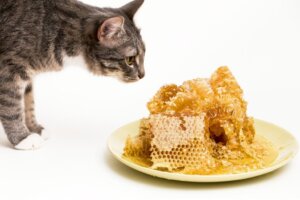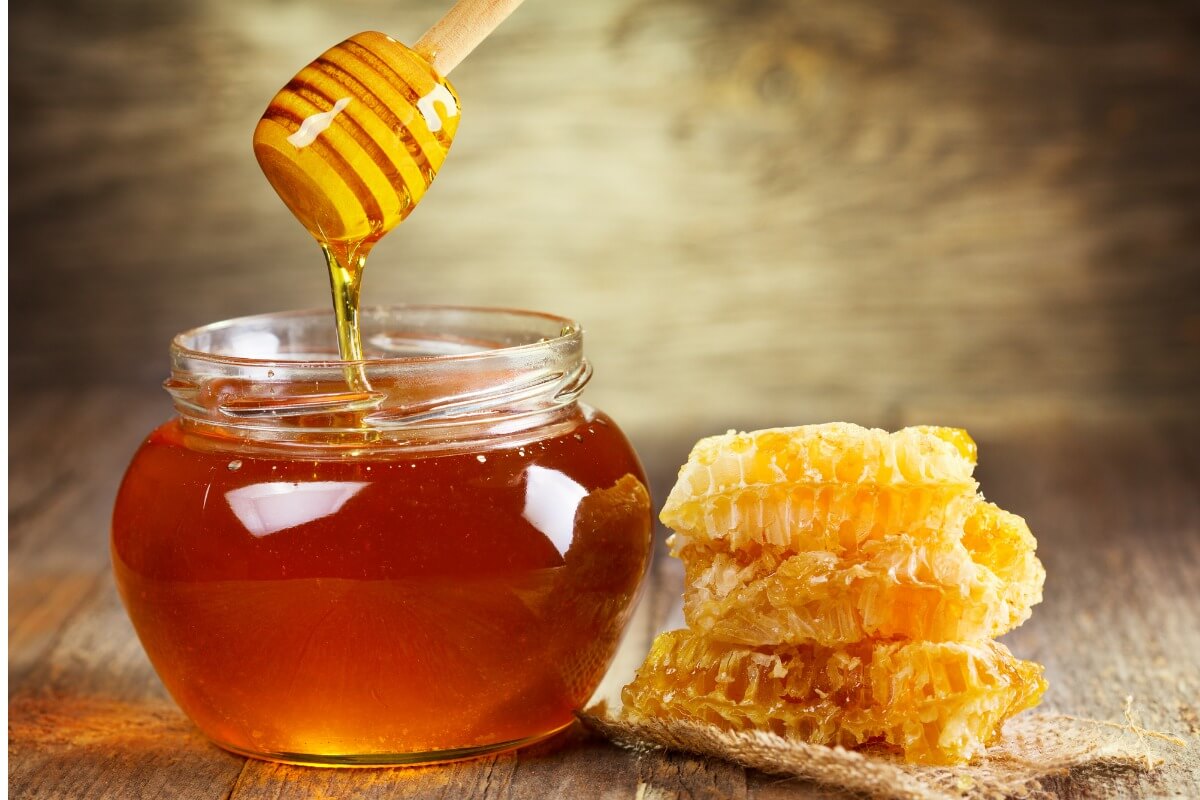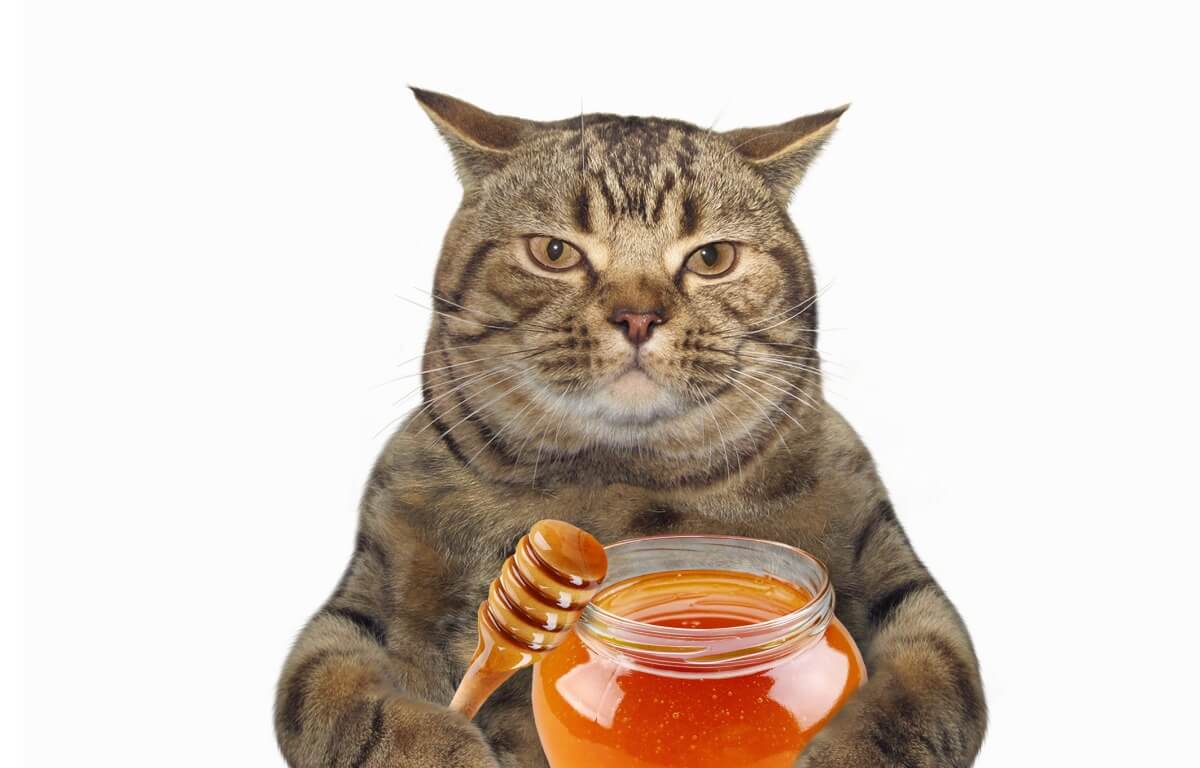Is Honey Good for Cats?


Reviewed and approved by the biologist Samuel Sanchez
Finding the balance between healthy and enjoyable food for your feline pet is no easy task. Keep in mind that not all foods or ingredients that humans ingest work the same way in animals, although some are sweet and appealing to their palate. Therefore, the following question arises: Is honey good for cats?
It’s important to know if a product contributes (or not) to the welfare of your pet. In this article, we’ll discover the components of honey and the effects that it could produce in a cat’s body. In this way, you’ll know if it’s a good idea to offer it to your pet.
Is honey safe for cats?
Honey is the only edible product for humans made by an insect (Apis mellifera). It contains great medicinal properties, is widely used in different culinary recipes, and serves as a sweetener for hot and cold drinks. However, we need to look at the impact that this food, produced by bees, has on a cat’s organism.
It should be noted that honey contains B vitamins such as thiamine, niacin, riboflavin, pantothenic acid, pyridoxine, and biotin. According to published research, and unlike other fruits and vegetables, this viscous liquid never loses this vitamin content unless it’s heated.
However, all these properties of this product don’t mean that it should be a major element in a cat’s diet. While felines can benefit from honey, it’s necessary to take into account some recommendations regarding its consumption. When used correctly, honey has the following properties:
- Provides energy: Unprocessed honey is one of the foods with the most energy content of all (304 kilocalories per 100 grams – 4 oz).
- It’s emollient: This means that it protects the gastrointestinal mucosa and could help to overcome health complications developed in that area. It’s sometimes recommended to alleviate symptoms in diseases such as feline gastritis.
- Acts as a bactericide: Ingesting honey may help your cat fight infections naturally.
- Promotes healing: It’s believed that honey can also promote healing and wound healing if applied topically. However, research hasn’t shown that this is proven in 100% of cases.

The correct dose
If you want to give honey to your pet, wait until your feline is five weeks old. From this age onwards, you can let your kitten eat a little honey mixed with milk. However, after reaching three months of age, it’s recommended that you only provide this food as a treat or when an illness requires it.
Similarly, remember that if you plan to include something in your pet’s diet, you should ask for the opinion and supervision of a veterinarian or professional regarding this subject. Also, don’t forget that recommending honey (or not) will depend on the immune system, digestive system, age, breed, and general health of your cat.
What type of honey is recommended for cats?
The best option for cats is organic honey. The more natural the honey is, the better. Therefore, you should purchase honey from a place that sells environmentally friendly and quality products. If you plan to use it topically, it’s best to get medical honey, as it’s sterilized to eliminate any contaminants.
Keep in mind that honey will never replace an antibiotic or antifungal ointment. Administer it only as an adjuvant and if recommended by a veterinarian.
Honey in cat food
In addition to the above, it should be noted that cats are carnivorous animals that don’t process sugars well. For this reason, including honey as a main ingredient in their diet is not a good idea. However, it is possible to give a little of this sweet ingredient to your pet, but only in small doses and as a complementary food.
It’s important to be clear that, despite its properties, honey doesn’t bring great benefits to a cat. Therefore, it’s crucial not to offer it to these animals frequently. Otherwise, you could cause vomiting, diarrhea, and even weight gain.
You should also avoid giving honey to your cat if you notice any allergic or negative reaction after consumption. Go to a veterinarian immediately at the slightest sign of any problem after ingesting it. Similarly, if your pet suffers from problems such as diabetes or obesity, it is best to keep honey out of reach.
Honey is very rich in sugars. Therefore, you should consult a professional before administering it to obese or diabetic cats.
Honey to treat topical wounds in cats
Honey doesn’t only work as food, but can also be used topically to treat wounds in cats. As mentioned above, you should use medical honey (any other type wouldn’t work). This product must have gone through a sterilization process to eliminate any contamination.
However, keep in mind that the medicinal properties of this compound are limited. Use it only if a veterinarian recommends it after a thorough analysis of your feline’s health.

In conclusion, honey isn’t the healthiest dietary choice for cats. Although felines can ingest it in small doses sometimes, experts recommend that its use is sporadic. Keep in mind that everything you include in a cat’s diet and lifestyle should contribute to their welfare.
All cited sources were thoroughly reviewed by our team to ensure their quality, reliability, currency, and validity. The bibliography of this article was considered reliable and of academic or scientific accuracy.
- Curación de heridas sépticas con miel de abejas. SciELO Cuba. Recogido el 18 de octubre de 2021 de: http://scielo.sld.cu/pdf/cir/v50n2/cir06211.pdf
- INTRODUCCIÓN A LA ALIMENTACIÓN CANINA Y FELINA. Recogido el 18 de octubre de 2021 de: http://www.ucv.ve/fileadmin/user_upload/facultad_agronomia/Alimentaci%C3%B3n_de_Caninos_y_Felinos.pdf
This text is provided for informational purposes only and does not replace consultation with a professional. If in doubt, consult your specialist.